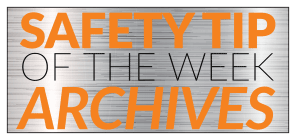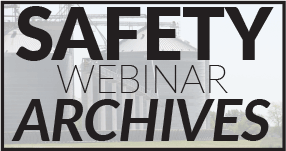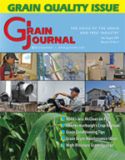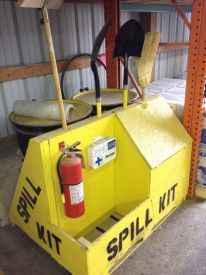| View HTML Version of Newsletter |
||||||||
 |
||||||||
 |
||||||||
Small Spill Response |
|
Published Every Monday by Grain Journal Editor Kendall Trump Unsubscribe |
||||||
|
Hazardous chemicals are used in many industries, including agriculture. It is important to be prepared for spills and releases. Consider making spill kits available in the workplace. The spill kit should contain critical equipment and items such as sorbent material, containment booms or socks, drain covers, a shovel and broom, an overpack drum or reclaim container, and personal protective equipment (PPE) such as chemical resistant boot covers, clothing, gloves, goggles, a faceshield, and respiratory protection (if applicable). Spill kits should remain accessible and should be inspected routinely. When responding to a small spill follow these simple steps: 1. Identify the substance and determine the risk – Identify the hazardous chemicals involved, the amount of liquid released, and the level of risk. Chemicals can be identified by locating and reading container labels, placards, etc. For extremely hazardous chemicals that are considered life threatening call 911 or the local authorities. 2. Isolate the area – Keep unauthorized persons out of the immediate area. 3. Protect yourself – Prior to responding to the spill, make sure to protect yourself. Consult the chemical’s Safety Data Sheet (SDS) for recommended PPE and response actions. 4. Stop the spill – Try to stop the spill at the source. This can involve closing a valve or turning a drum right side up. If this cannot be performed safely and quickly, shift efforts to containing the spill. 5. Contain the spill – Properly containing the spill can minimize the spread. Use sorbent materials to create berms to prevent the spill from spreading and impacting waterways, ditches, storm drains, etc. 6. Clean up the spill – Collect the materials used to clean up the spill for disposal. Decontaminate the area and tools used as needed. 7. Properly dispose of spilled materials – Consult the chemical’s SDS to ensure proper disposal.
By: Joe Mlynek is president of Progressive Safety Services LLC, Gates Mills, OH; joe.mlynek@progressivesafety.us; and content creation expert for Safety Made Simple Inc., Olathe, KS; joe@safetymadesimple.com
|
 |
|||||||
 |
||||||||
Current Issue of Grain Journal |
||||||||
USEFUL INFO Product/Service Directory Equipment Catalog Digital Edition Archives 2018-19 Grain/Feed/Milling Convention Calendar |
||||||||
 |
||||||||
| Grain Journal is a bi-monthly magazine for the grain and feed industries published in Decatur, IL - 800-728-7511 | website: www.grainnet.com Click here to forward this newsletter to a friend. |
||||||||
